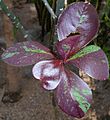Euphorbia grantii
| African milk bush | |
|---|---|

| |
| Scientific classification | |
| Kingdom: | Plantae |
| Clade: | Tracheophytes |
| Clade: | Angiosperms |
| Clade: | Eudicots |
| Clade: | Rosids |
| Order: | Malpighiales |
| Family: | Euphorbiaceae |
| Genus: | Euphorbia |
| Species: | E. grantii
|
| Binomial name | |
| Euphorbia grantii | |
| Synonyms[1] | |
Euphorbia grantii (syn.) Synadenium grantii) is a species of succulent plant in the family Euphorbiaceae, which is native to Africa.
Name
[edit]The specific epithet grantii is in honour of the Scottish explorer James Augustus Grant.[2] It was originally described by Daniel Oliver in 1875.[3] The plant has the common name of African milk bush. The synonym Synadenium grantii is in circulation, too.
Distribution
[edit]The plant is native in the African tropics, in particular in Malawi, Kenya and Uganda.[4] It grows at altitudes of 500–2100 meters. It has been introduced in many other tropical regions.
Usage
[edit]It is often grown as a hedge plant and as a traditional grave marker among the peoples of central Kenya (Agĩkũyũ, Akamba, etc.).[5]
In 1952 during the Mau Mau Uprising, the poisonous latex of the plant was used to kill cattle.[6]
Gallery
[edit]References
[edit]- ^ The Plant List (2013). Version 1.1. Published on the Internet; http://www.theplantlist.org/tpl1.1/record/kew-79947 Archived 17 March 2019 at the Wayback Machine (accessed 28 September 2017).
- ^ Oliver, Daniel. 1875. Transactions of the Linnean Society of London, 29(3): 144.
- ^ "Euphorbia grantii". International Plant Names Index (IPNI). Royal Botanic Gardens, Kew; Harvard University Herbaria & Libraries; Australian National Botanic Gardens. Retrieved 12 July 2010.
- ^ Synadenium grantii Hook.f., The Encyclopedia of Succulents. http://www.llifle.com/Encyclopedia/SUCCULENTS/Family/Euphorbiaceae/23048/Synadenium_grantii Archived 6 June 2019 at the Wayback Machine
- ^ (Book) Trees of Kenya, by Tim C. Noad and Ann Birnie, p.109, Self-Published in Nairobi, Kenya 1989
- ^ Bernard Verdourt, E.C. Trump and M.E. Church (1969). Common poisonous plants of East Africa. London: Collins. p. 254.
External links
[edit] Data related to Euphorbia grantii at Wikispecies
Data related to Euphorbia grantii at Wikispecies







